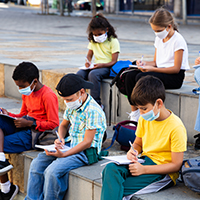Chapter 2: Supporting students coping with Covid-19 grief
Activities to facilitate conversations about Covid impacts, death, and grief

“I have often found that engaging conversations through activities works well with most students, especially those who are usually shy to speak up. The activity seems to stretch their comfort levels”. - Teacher
Click on the tabs below to view each activity.Purpose
This activity allows you to engage your students in setting the expectations for the classroom.
Materials:
- Bristol Board
- Markers
- Stickers
Instructions
- Ask the students what their goals are for the year. Write these down in the first section of the contract.
- Ask students how they need to feel each day in the classroom to be able to reach their goals (examples: safe, content, calm). Write these down in second section of the contract.
- Ask students how they need to treat each other to help everyone reach their goals. Write their ideas down in the third section of the contract.
- Include ‘Stay Healthy’ in the first section (‘Goals’) and the COVID-19 protocols in the third section (How we need to treat each other).
- Have all students sign (by writing their name or placing a sticker) the class contract and explain that this is their promise to work hard every day to meet these expectations so everyone can reach their goals this year.
- Place in accessible spot in classroom and check-in on contract and how class feels they are doing/if they need to add or change anything every few weeks.
Purpose:
This allows for on-going conversation about COVID-19 in a structured way.
Materials:
- Jar
- Decorations (ribbon, wrapping paper, paint, glue)
- Writing utensil
- Small strips of paper
Instructions
- Create a ‘COVID Question Jar’.
- Introduce students to the Question Jar and let them know that if they have any questions related to COVID-19 (or anything at all, if you would like) that they can write the questions down and put them in the jar.
- Set a weekly time when you will go through the jar and *do your best* to answer questions. Be sure to let the class know that sometimes the answer will be that you don’t know.
- Review questions prior to answering to ensure you are able to give the class your best answer
Purpose:
This activity will give students a chance to ask their COVID-related questions to a medical professional.
Materials:
• Box
• Paper
• Writing Utensils
• Doctor!
Instructions:
1. Find a doctor who is willing to join your classroom either virtually or in-person for a session of ‘Ask the Doctor’.
2. Prepare students a few days before hand and encourage them to write their questions down and put them in the box for the Doctor.
3. Connect with the Doctor one day prior to their visit and review questions with them.
4. Include questions yourself that you have been asked (in person or via the question jar) that you could not answer.
Purpose:
This activity will provide a facilitated conversation about what has changed since COVID-19 began and will support children in naming their experiences.
Materials:
• Bristol Board/Smart Board/Chalk Board
• Paper
• Writing utensils
Instructions:
1. Split students into smaller groups (3-4 students).
2. Provide each group with writing utensils and paper.
3. Have students divide their paper in two (Before and After COVID-19).
4. Have them work together to record what their life included before COVID-19 and what it does/does not include now.
5. Encourage them to think both of things that are different AND things that are the same (ie. some things will be on both lists).
6. Bring the class together as a whole and have each group share their lists.
7. Record groups lists on a ‘master’ list.
8. Engage students in a conversation about which changes have been hard and which have been easier for them.
Purpose:
This activity allows students to engage with and honour their feelings of grief and loss around changes that have come about due to COVID-19.
Materials:
• Bucket or box
• Paper
• Writing Utensils
• Craft Supplies
Instructions:
1. Ask students to think about something that has changed due to COVID-19 and has been very disappointing or hard for them
2. Have students create an art piece that shows/represents this change.
3. Invite students to share these pieces and what has been a hard change.
4. Engage students in a conversation about their feelings related to these changes.
5. Have students place these art pieces in collective bucket or box and ask them how they would like to honour their hard feelings and the hard changes.
See also:KidsGrief.ca
MyGrief.ca









